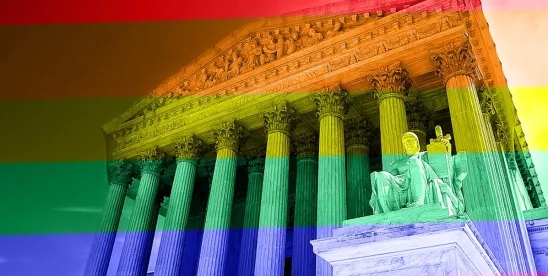The Supreme Court of the United States has agreed to hear a case in which a female heterosexual employee claimed an Ohio state agency discriminated against her in favor of employees who identify as LGBTQ+. The case, Ames v. Ohio Department of Youth Services, may shed light on what constitutes illegal bias against a majority group.
Specifically, the Supreme Court is likely to decide whether an employee must meet the “background circumstances” rule in cases alleging reverse discrimination, or if an employee may rely on the evidence surrounding his or her own employment circumstances to prove discrimination.
Quick Hits
- The Supreme Court recently agreed to hear a case brought by a heterosexual woman who claimed discrimination based on her sexual orientation after she was demoted.
- The federal law banning sex discrimination also bars discrimination based on a person’s sexual orientation and gender identity.
- It is anticipated that the Supreme Court will resolve the circuit split on whether a heightened evidentiary burden, highlighted in the background circumstances rule, can be applied to reverse discrimination cases.
Background on the Case
On October 4, 2024, the Supreme Court agreed to hear a discrimination case brought by a heterosexual woman who was demoted at the Ohio Department of Youth Services. The department oversees the confinement of juvenile felony offenders.
A heterosexual woman served as the department’s administrator of the federal Prison Rape Elimination Act (PREA). She applied and interviewed to be the department’s bureau chief of quality. The department terminated her employment as PREA administrator and offered her another job that amounted to a demotion with less pay, which she took. The department later hired a gay man to serve as PREA administrator and a gay woman to be bureau chief of quality. The heterosexual woman filed a discrimination lawsuit, alleging discrimination in violation of Title VII of the Civil Rights Act of 1964.
The district court granted summary judgment to the Ohio Department of Youth Services, finding that the employee had failed to present any background information or data to demonstrate discrimination in the department’s hiring practices or policies. The employee appealed, and on December 4, 2023, the U.S. Court of Appeals for the Sixth Circuit found she did not produce sufficient evidence to prove discrimination.
The appeals court acknowledged that being heterosexual is a legally protected status under federal law, but stated that plaintiffs must show “‘background circumstances to support the suspicion that the defendant is that unusual employer who discriminates against the majority,’” meaning heterosexual people in this case. The Sixth Circuit thus concluded the plaintiff didn’t prove the department exhibited a pattern of discrimination against members of the majority group.
The plaintiff’s “only evidence of a pattern of discrimination against heterosexuals is her own demotion and the denial of the bureau chief position,” the court stated. “Under our caselaw, however, a plaintiff cannot point to her own experience to establish a pattern of discrimination.”
The Sixth Circuit further found that the plaintiff had not shown that the employer’s stated reason for the demotion was a pretext for discrimination. In this case, the plaintiff argued that the reasons for demoting her were not based on fact, but the appellate court noted her performance evaluation shortly before the demotion was “lukewarm” and sometimes “critical.” Therefore, the appeals court agreed the department had grounds to demote her based on lackluster performance. In ruling for the department, Judge Raymond Kethledge filed a concurring opinion, arguing that the Supreme Court may want to address the issue of whether Title VII’s anti-discrimination laws “impose different burdens on different plaintiffs based on their membership in different demographic groups.”
On October 4, 2024, the Supreme Court agreed to hear the case. A circuit split exists on the evidentiary burden that employees must meet in reverse discrimination cases. Four circuits, including the Sixth Circuit, have adopted the background circumstances rule. Two other circuits have rejected the background circumstances rule, and five other circuits do not apply it, treating discrimination claims from majority groups similarly to claims from plaintiffs in other groups.
Next Steps
The Supreme Court will hear this case during its current term, which will end in late June 2025. A date for oral arguments has not been set yet.
While it is possible that the Supreme Court may decide the case on more narrow grounds, many legal scholars expect the court will resolve the circuit split that exists in the appellate courts and overrule the “background circumstances” rule. Accordingly, the prevailing legal standard may be upended in many states. The Supreme Court’s ruling is likely to shed light on what evidence will be sufficient to prove discrimination against a majority group.
Employers may wish to consistently apply workplace policies and promotion standards to prevent discrimination lawsuits. Employers also may wish to review their workplace policies, practices, and training materials to ensure that they reflect how the law protects both straight and LGBTQ+ employees from discrimination and harassment.
Employers can review the most recent guidance regarding LGBTQ+ rights, which the U.S. Equal Employment Opportunity Commission (EEOC) released on April 29, 2024. The guidance states that Title VII of the Civil Rights Act of 1964 prohibits discrimination based on sexual orientation and gender identity as part of the law’s broader protections against sex-based discrimination. Heterosexual and gay are both legally protected classes.






 />i
/>i
